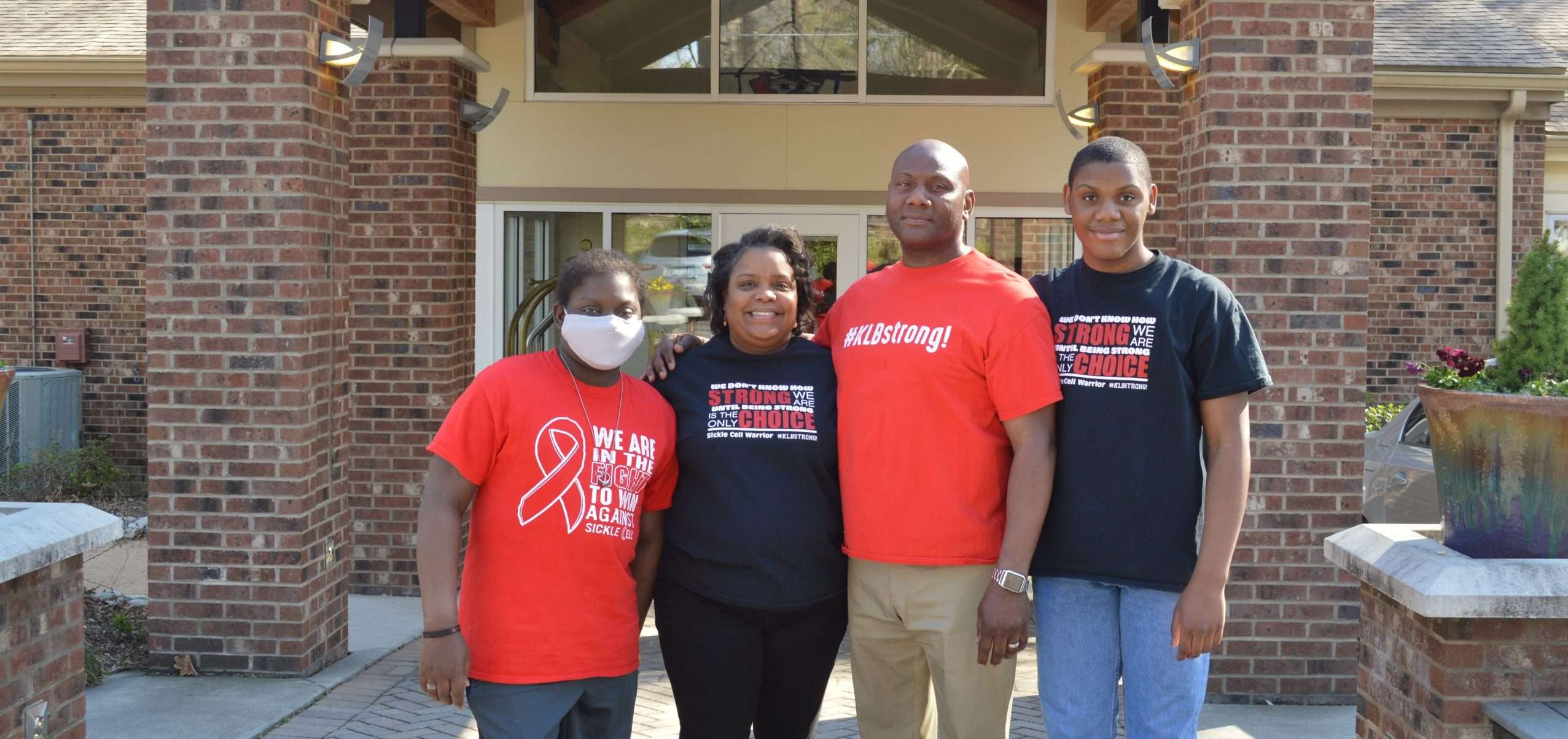Thanks to a Transplant, a North Carolina Teen is Winning his Sickle Cell Anemia Battle

 June 1, 2020 — World Sickle Cell Day, which is June 19th, was created by the United Nations as a day to raise awareness of sickle cell at national and international levels. In creating this day of awareness the United Nations has recognized sickle cell disease as, “one of the world’s foremost genetic diseases.” The Brown family of Elizabeth City, North Carolina, knows all too well the challenges of this painful and debilitating disease. Their son, Kelvin Jr., has been battling sickle cell disease since he was diagnosed as an infant.
June 1, 2020 — World Sickle Cell Day, which is June 19th, was created by the United Nations as a day to raise awareness of sickle cell at national and international levels. In creating this day of awareness the United Nations has recognized sickle cell disease as, “one of the world’s foremost genetic diseases.” The Brown family of Elizabeth City, North Carolina, knows all too well the challenges of this painful and debilitating disease. Their son, Kelvin Jr., has been battling sickle cell disease since he was diagnosed as an infant.
Kelvin Brown, Jr. was born in May 2001 at Martin Army Community Hospital on the post of Fort Benning, Georgia, to Sharon and Kelvin Brown, Sr. Big brother Dwayne was excited to be welcoming a new member of the family. But joy and excitement turned to worry when the family was told their six-week-old Kelvin had Sickle Cell Beta Thalassemia. At the time, his parent were aware of the disease but they quickly became quite knowledgeable about this awful diagnosis. The reality of what they would be facing was truly daunting and devastating.
Sickle Cell Disease (SCD) is a genetic condition that causes normally round and flexible blood cells to become stiff and sickle-shaped. This hinders the blood cells and the oxygen they carry from being able to freely move throughout the body. The sickle-shaped cells cause pain as they flow through a person’s arteries and veins. People struggling with SCD are typically in some level of constant pain. Over time SCD can damage the liver, kidneys, lungs, heart and spleen. The only known cure for SCD is a bone marrow transplant, but this is only possible for a limited number of SCD patients who find a suitable donor.
Kelvin spent most of his young life in and out of doctors’ offices and hospitals dealing with various pain crises  and other conditions that resulted from living with sickle cell. Growing up with SCD had many challenges for Kelvin, but the biggest hurdles were likely with his education. Numerous medical appointments interrupted his class schedule each year and greatly limited his recreational outlets. According to Mom Sharon, Kelvin worked extra hard to attend school and/or attend the hospital school while undergoing regular pain management treatment. She was always proud that throughout this journey Kelvin would take the opportunity to speak with his many friends and classmates about SCD in an effort for them to understand his life a little better and to be aware of the struggle accompanying this disease.
and other conditions that resulted from living with sickle cell. Growing up with SCD had many challenges for Kelvin, but the biggest hurdles were likely with his education. Numerous medical appointments interrupted his class schedule each year and greatly limited his recreational outlets. According to Mom Sharon, Kelvin worked extra hard to attend school and/or attend the hospital school while undergoing regular pain management treatment. She was always proud that throughout this journey Kelvin would take the opportunity to speak with his many friends and classmates about SCD in an effort for them to understand his life a little better and to be aware of the struggle accompanying this disease.
At the age of 14, Kelvin started having more frequent, longer and intensified pain crises. His teenage, friend-filled way of life came to an abrupt halt. He could no longer push to go to school or do what ‘normal’ teenagers were doing. His body was always in pain. It was at this point in Kelvin’s journey that his medical team suggested the family consider a bone marrow/stem cell transplant to hopefully provide him a more promising future. Sharon remembers that moment to this day. She also recalls that after much prayer, she and her husband decided they had to do whatever possible to give Kelvin a chance at a sickle cell-free future and a pain-free life.
 Once they decided to start the transplant process, the Browns knew the transplant and the recovery would come at a very big price — both in terms of dollars and in terms of relocation to the transplant center nearly 200 miles away from their home. Recovery from this type of transplant is typically long and arduous, which meant that one parent was going to need to suspend his/her job (or take a prolonged leave of absence) for the time Kelvin would be inpatient at Duke University Medical Center in Durham, North Carolina.
Once they decided to start the transplant process, the Browns knew the transplant and the recovery would come at a very big price — both in terms of dollars and in terms of relocation to the transplant center nearly 200 miles away from their home. Recovery from this type of transplant is typically long and arduous, which meant that one parent was going to need to suspend his/her job (or take a prolonged leave of absence) for the time Kelvin would be inpatient at Duke University Medical Center in Durham, North Carolina.
During meetings with a transplant coordinator at Duke, it was recommended the family research the Children’s Organ Transplant Association (COTA) as an avenue for fundraising to help with the myriad of transplant-related expenses they would be facing. Sharon and her sister called COTA on April 5, 2018, and almost instantly felt a sense of relief. They had many questions that were answered quickly and efficiently. The next day, April 6th, Sharon signed and returned the COTA agreement and Kelvin became part of the COTA Family.
COTA uniquely understands that parents who care for a child or young adult before, during and after a life-saving transplant have enough to deal with, so COTA’s model shifts the responsibility for fundraising to a community team of trained volunteers. COTA is a 501(c)3 charity so all contributions to COTA in honor of Team Kelvin B are tax deductible to the fullest extent of the law, and these COTA funds are available for a lifetime of transplant-related expenses.
Two weeks later on April 18th, a COTA fundraising specialist traveled to Elizabeth City, North Carolina, to meet  with the family’s volunteers and walked them through the entire process. Within days of their on-site training, the COTA for Team Kelvin B was off and running, sharing the online donation link, planning fundraisers and working with COTA’s team of professionals. The Brown family’s friends, neighbors, employers, church community, i.e. most all of the residents of Elizabeth City, wanted to get involved — especially once they learned how long the family would be living hundreds of miles away at Kelvin’s bedside.
with the family’s volunteers and walked them through the entire process. Within days of their on-site training, the COTA for Team Kelvin B was off and running, sharing the online donation link, planning fundraisers and working with COTA’s team of professionals. The Brown family’s friends, neighbors, employers, church community, i.e. most all of the residents of Elizabeth City, wanted to get involved — especially once they learned how long the family would be living hundreds of miles away at Kelvin’s bedside.
Kelvin’s official transplant journey began on May 14, 2018. On that day he was admitted to Duke to do the necessary preparation (13 days of chemotherapy) for his stem cell transplant. On May 30th, one day shy of his 17th birthday, Kelvin received the stem cells. Because Kelvin’s immune system was depleted by chemotherapy, he was extremely vulnerable to infection. To avoid infections, strict isolation had to be observed. Kelvin was confined to the Duke transplant unit and had contact only with his doctors, nurses and caregivers who all were covered with gowns, gloves and masks.
The side effects of chemotherapy, including mouth sores, hair loss, nausea, vomiting, and loss of appetite, were uphill battles for Kelvin and his parents. Nutrition was given via his central line or NG tube. The Browns had been warned the first 100 post-transplant days were going to be challenging and were crucial to his long-term recovery. Even with that knowledge Sharon says no one could likely be adequately prepared for what he endured.
During this time, Kelvin received blood and platelet transfusions. He was on continuous dialysis and was placed on a ventilator for a period of time. Kelvin then spent several weeks recovering and fighting delirium. On June 26th, Kelvin went into renal and respiratory failure and was moved to Duke’s Pediatric Intensive Care Unit. As Sharon remembers these long and exhausting days she said, “All we could do was wait and pray while his future was so very uncertain.” He spent a week on a ventilator and started 24-hour, 7 days a week dialysis. Even though the medical team was able to get him breathing on his own again, Kelvin remained on dialysis because his kidneys had stopped functioning.
Kelvin began to recover but then tragedy struck again — respiratory failure. On July 29th, he was placed back on the ventilator. This time Kelvin remained on a ventilator/oscillator for 26 days. During these stress-filled days, he was put into a paralyzed state. After weeks of not knowing if he was going to make it off the ventilator, a painful decision had to be made because his carbon dioxide levels were skyrocketing.
Sharon remembers, “How do you discuss DNR (Do Not Resuscitate) for your 17-year-old son?” Eventually Sharon and Kelvin Sr. had no choice and he had to be removed from ventilation. Sharon said, “We knew that he would either breathe on his own or he would slip away from us. Praise God … he started breathing on his own!”
Due to the time Kelvin had been kept in a paralyzed state, many ‘normal everyday things’ had to be retaught. For instance Kelvin had to learn to talk, eat, move and walk all over again. And all of this therapy and retraining had to be done while he was still connected to a kidney dialysis machine.
 On September 7th, Kelvin celebrated his first 100 days post transplant; however, he celebrated it in the PICU. He was receiving occupational and physical therapy every day to help him regain his strength. The many members of Kelvin’s medical team celebrated with the family on October 13th when Kelvin was able to walk nearly 140 feet. He was also progressing neurologically and cognitively, and on October 15th, he officially started his senior year of high school through an online course with assistance from a hospital-based educator.
On September 7th, Kelvin celebrated his first 100 days post transplant; however, he celebrated it in the PICU. He was receiving occupational and physical therapy every day to help him regain his strength. The many members of Kelvin’s medical team celebrated with the family on October 13th when Kelvin was able to walk nearly 140 feet. He was also progressing neurologically and cognitively, and on October 15th, he officially started his senior year of high school through an online course with assistance from a hospital-based educator.
On November 20, 2018, Kelvin was released from the PICU and transferred back to the bone marrow unit at Duke Medical Center. This was a huge step in Kelvin’s recovery and the medical team and his family celebrated this victory on social media with many photos and messages of gratitude. On January 16, 2019, Kelvin was released from Duke to the Ronald McDonald House of Durham. The Ronald McDonald House was a gift for this family who was unsure how long Kelvin would need to live in Durham for the many ongoing doctors’ appointments, physical therapy sessions and kidney dialysis. Also during this time in Kelvin’s healing, he was being weaned off immune suppressant drugs and was finally able to receive his very necessary immunizations.
Sharon reflects on Kelvin’s transplant journey, which is still ongoing, “When we relocated to Duke we were ready for some of it but not for all of it. We had mentally prepared for the prep for transplant, the transplant and then for 100 days post transplant, inpatient care. But what we actually experienced was so much more. There was no way we could have been ready for all we have been through. We are so grateful for our team of COTA volunteers who worked behind the scenes back at home raising funds for the mounting transplant-related expenses that accompanied the seemingly endless stay at Duke.”
Once Sharon finally allowed herself to ‘celebrate’ Kelvin’s post-transplant milestones, she shared these were the  top three:
top three:
- Kelvin making it to one-year post transplant on May 30, 2019.
- Kelvin celebrating his 18th birthday on May 31, 2019.
- Kelvin’s high school graduation on June 8, 2019.
- Kelvin completed a summer school course at College of The Albemarle.
“We are all so proud of all of his milestones and accomplishments despite his many medical challenges,” she said.
On August 2, 2019, Kelvin was readmitted to Duke Medical Center Hospital due to a bacterial infection. After receiving about two weeks of IV antibiotics, Kevin’s team of medical professionals determined he needed to undergo surgery to receive a peritoneal dialysis catheter. Kelvin has been receiving peritoneal dialysis for the past 10 months and will continue to do so until a life-changing kidney is found. Kelvin and his parents are still living in temporary housing close to Duke due to his other regular appointments that include bone marrow clinic, physical therapy and pain management therapy.
“Even through all of this we received great news — Kelvin is cured from sickle cell disease!” Sharon was excited to share. “His body is only making donor cells. The bone marrow transplant was a complete success. Now we are waiting to get that much needed kidney.”
The Brown family planned to return home to Elizabeth City in December and patiently wait for a life-saving kidney transplant. “That was the plan … but plans changed,” Sharon said. Kelvin caught the flu and on December 14, 2019, he was immediately transported from the clinic straight to the Pediatric Intensive Care Unit at Duke. According to Sharon, it was touch and go for several days. The family did not make it home for Christmas. Kelvin was finally released from the PICU to the Ronald McDonald House on New Year’s Eve. The family celebrated the greatest gift — being back together again.
In February 2020, the family was given the green light to take Kelvin home to Elizabeth City and only return to Durham every other week. According to Sharon this was such an amazing, but terrifying, chapter for their family. What will our new normal be like? Can we manage the driving back and forth? How will we manage dialysis?
But then, the coronavirus, COVID-19, happened. After talking with Kelvin’s medical staff and making some  medical adjustments, the family returned to their home on March 22, 2020. They are currently under strict stay at home orders, but they are all together. Kelvin still has essential appointments at Duke two days each month, which is a frightening trip for Sharon each time they have to make it.
medical adjustments, the family returned to their home on March 22, 2020. They are currently under strict stay at home orders, but they are all together. Kelvin still has essential appointments at Duke two days each month, which is a frightening trip for Sharon each time they have to make it.
Sharon also is very aware of COTA’s role in her family’s ongoing transplant journey. “The support we have received from the Children’s Organ Transplant Association (COTA) has been exceptional. We are grateful for the kind staff members who got us started as a COTA family. The customer service provided by everyone at COTA is second to none. We truly feel that if there is anything we need or questions we need answered, someone is always there to help. As Kelvin transitions to a young adult it is reassuring to know COTA’s support will be with him … for a lifetime,” Sharon said.
Kelvin’s next hurdle is a kidney transplant. Without a kidney, he may have to be on dialysis for the rest of his life. Kelvin is continuing to recover, gain strength and do what he loves — creating beautiful artwork and listening to music. He hopes to attend college and study electrical or mechanical engineering.
Kelvin’s blood type is O+. Anyone who wishes to see if he/she is a kidney match is encouraged to call Duke’s Transplant Center at 919.551.3965 to learn more and to start the screening process. All organ donors will remain anonymous. COTA can also assist with a donor’s transplant-related expenses.



